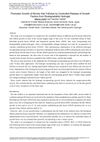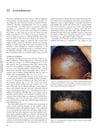1 citations,
January 2014 in “Journal of clinical & experimental dermatology research” Naringi crenulata leaf extracts promote hair growth.
 April 2007 in “한방재활의학과학회지”
April 2007 in “한방재활의학과학회지” Saengbal-eum promotes hair growth similarly to Minoxidil and could be used for alopecia treatment.
 29 citations,
January 2007 in “American Journal of Clinical Dermatology”
29 citations,
January 2007 in “American Journal of Clinical Dermatology” Eyebrow loss has many causes and requires accurate diagnosis for proper treatment.
 74 citations,
March 2001 in “Seminars in Cutaneous Medicine and Surgery”
74 citations,
March 2001 in “Seminars in Cutaneous Medicine and Surgery” The document concludes that skin biopsies, genetic and environmental factors, and specific treatments are important in managing cutaneous lupus erythematosus.
 42 citations,
January 2007 in “Pediatric dermatology”
42 citations,
January 2007 in “Pediatric dermatology” Low-potency steroids can cause serious side effects in people with skin conditions like Netherton syndrome.
January 2020 in “한국공업화학회 연구논문 초록집” Encapsulated hair cells in a special gel can help regenerate hair follicles, potentially treating hair loss.
188 citations,
January 2003 in “Recent results in cancer research/Recent Results in Cancer Research” Vitamin D is essential for bone health and may reduce risks of several diseases.
 58 citations,
March 2020 in “Scientific Reports”
58 citations,
March 2020 in “Scientific Reports” EGFR-TKIs can cause significant skin, nail, and organ side effects.
 June 2005 in “Key Engineering Materials”
June 2005 in “Key Engineering Materials” Using hydrogels to slowly release growth factors can effectively boost hair growth in mice.
 5 citations,
May 2004 in “International Journal of Cosmetic Science”
5 citations,
May 2004 in “International Journal of Cosmetic Science” Versican is important for hair growth and could help find new hair regrowth treatments.
 9 citations,
September 1999 in “Journal of the European Academy of Dermatology and Venereology”
9 citations,
September 1999 in “Journal of the European Academy of Dermatology and Venereology” Skin ulcers from interferon may not depend on the amount given.
 1 citations,
November 1998 in “Journal of Small Animal Practice”
1 citations,
November 1998 in “Journal of Small Animal Practice” The dog had a Sertoli cell tumor, which was successfully removed with surgery.
 46 citations,
December 2006 in “Anais Brasileiros de Dermatologia”
46 citations,
December 2006 in “Anais Brasileiros de Dermatologia” Acne is the most common skin problem in Brazil, with a need for improved dermatological care and health education, especially for the public sector and black-skinned individuals.
 1 citations,
December 2005 in “Therapeutische Umschau”
1 citations,
December 2005 in “Therapeutische Umschau” The document concludes that protecting skin from the sun, avoiding smoking, and using treatments like Minoxidil and Finasteride can help manage skin and hair aging.
 21 citations,
January 2003 in “Skin pharmacology and physiology”
21 citations,
January 2003 in “Skin pharmacology and physiology” Different skin cells process testosterone differently, and certain drugs can change this process, possibly helping treat acne and hair loss.
7 citations,
June 2020 in “npj regenerative medicine” GDNF helps grow hair and heal skin wounds by acting on hair stem cells.
2 citations,
January 2003 in “Dermatologic surgery” The 800-nm pulsed diode laser is a safe and effective long-term treatment for trichostasis spinulosa in dark-skinned individuals.
 28 citations,
December 2006 in “Clinical lung cancer”
28 citations,
December 2006 in “Clinical lung cancer” Early recognition and management of skin side effects from new cancer therapies can prevent treatment delays.
 24 citations,
January 2003 in “Drug Delivery”
24 citations,
January 2003 in “Drug Delivery” Minoxidil-containing vesicles improve hair growth.
 64 citations,
May 2019 in “Materials Science and Engineering: C”
64 citations,
May 2019 in “Materials Science and Engineering: C” Microneedle technology has improved drug delivery and patient comfort but needs more research for broader use.
 36 citations,
October 1996 in “Dermatologic Clinics”
36 citations,
October 1996 in “Dermatologic Clinics” Mice are useful for researching human hair loss and testing treatments, despite some differences between species.
 April 2012 in “Informa Healthcare eBooks”
April 2012 in “Informa Healthcare eBooks” Trichotillomania is a disorder where people compulsively pull out their hair, treated with drugs and behavior therapy.
 March 1988 in “Reactions (Auckland)”
March 1988 in “Reactions (Auckland)” Birth control pills can improve or cause acne and hair issues, with improvements more common, and may affect skin pigmentation.
 9 citations,
April 2023 in “Journal for Research in Applied Sciences and Biotechnology”
9 citations,
April 2023 in “Journal for Research in Applied Sciences and Biotechnology” Zinc is important for growth and health in animals, plants, and humans, and not having enough can cause various problems.
13 citations,
June 1999 in “Seminars in cutaneous medicine and surgery” Using topical agents before and after cosmetic surgery improves the results.
14 citations,
June 2020 in “BMC genomics” The study identified key genes that regulate the growth cycle of cashmere in goats, which could help improve breeding strategies.
1 citations,
February 2023 in “Pharmaceutics” New UVA-responsive nanocapsules effectively kill microorganisms in hair follicles when activated by light.
January 2019 in “Springer eBooks” Sebaceous glands play a key role in skin health and conditions like acne.
8 citations,
November 2017 in “Current problems in dermatology” Cancer treatments targeting specific cells often cause skin problems, which can affect how much medicine patients can take.

A 12-year-old girl in Saudi Arabia with Focal dermal hypoplasia showed skin and dental symptoms, highlighting the condition's variability and the need for personalized treatment.



















